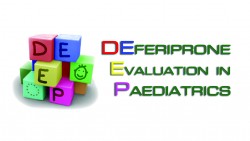DEEP project - "Success story" for European Commission's DG Research and Innovation
DEEP is a 6-year European project coordinated by Consorzio per Valutazioni Biologiche e Farmacologiche and funded by the European Union’s 7th Framework Programme for Research and Technological Development, with the aim to integrate the existing information on deferiprone use in paediatric patients, and provide a valid support to the use of the drug in this class of age. As explained also in the article, patients with thalassaemia cannot produce normal haemoglobin and regular blood transfusions are the only treatment available. Nevertheless, iron overload is inevitable, and the use of iron chelator is needed to remove the excess of iron from the blood. The oral iron chelator deferiprone was authorised in Europe on August 1999 and is currently indicated for the treatment of iron overload in patients with B-thalassaemia major when deferoxamine (DFO) is contraindicated or inadequate. Deferiprone is considered very effective in adult patients, although a scarcity in the number of clinical studies in the paediatric population discourages its use in children. The article published on the EC website underlined the wide efforts and the numerous resources spent by the researchers working in the framework of the DEEP project in order to provide evidence confirming the correct dosage of deferiprone (DFP) for use in children (DEEP-1 PK study results) and develop a new oral liquid formulation of DFP suitable for paediatric use. In particular, the European Commission's DG Research and Innovation has particularly appreciated the international cooperation aspect characterising the project. In particular, the collaboration with the Egyptian partner of the DEEP Consortium has been highlighted and a quote of Amal El-Beshlawy, professor at the University of Cairo and chair of the Egyptian Thalassemia Association, regarding the huge relevance of the project and the importance of a global cooperation, has been reported. The complete article is available here: http://ec.europa.eu/research/infocentre/article_en.cfm?&artid=48856&caller=other(opens in new window)
Countries
Albania, Cyprus, Egypt, Greece, Italy, Tunisia, United Kingdom



